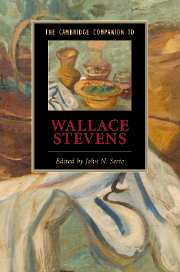Book contents
- Frontmatter
- Introduction
- 1 Wallace Stevens: A Likeness
- 2 Stevens and Harmonium
- 3 Stevens in the 1930s
- 4 Stevens and the supreme fiction
- 5 Stevens’ late poetry
- 6 Stevens and his contemporaries
- 7 Stevens and romanticism
- 8 Stevens and philosophy
- 9 Stevens’ seasonal cycles
- 10 Stevens and the lyric speaker
- 11 Stevens and linguistic structure
- 12 Stevens and painting
- 13 Stevens and the feminine
- 14 Stevens and belief
- Further reading
- Index
10 - Stevens and the lyric speaker
Published online by Cambridge University Press: 28 May 2007
- Frontmatter
- Introduction
- 1 Wallace Stevens: A Likeness
- 2 Stevens and Harmonium
- 3 Stevens in the 1930s
- 4 Stevens and the supreme fiction
- 5 Stevens’ late poetry
- 6 Stevens and his contemporaries
- 7 Stevens and romanticism
- 8 Stevens and philosophy
- 9 Stevens’ seasonal cycles
- 10 Stevens and the lyric speaker
- 11 Stevens and linguistic structure
- 12 Stevens and painting
- 13 Stevens and the feminine
- 14 Stevens and belief
- Further reading
- Index
Summary
Because the lyric poem so often speaks in a first-person voice, we unconsciously expect to hear in its lines someone saying, “No, I am that I am” (Shakespeare) or “I wandered lonely as a cloud” (Wordsworth), or “I too dislike it” (Marianne Moore) or “Black like me” (Langston Hughes). Wallace Stevens sometimes writes poems of this openly personal sort: “
The exceeding brightness of this early sun
Makes me conceive how dark I have become. . . .
(108)But Stevens' use of the naked first-person voice is relatively rare. The most frequent substitute in lyric for the first-person singular is the first-person plural: “Like as the waves make toward the pebbled shore, / So do our minutes hasten to their end” (Shakespeare); “Oh joy, that in our embers / Is something that doth live” (Wordsworth); “We outgrow love, like other things” (Emily Dickinson). Stevens is much attached to this first-person plural voicing, which serves him, as it has many poets, as a philosophic resource in asserting something true of all human beings:
We live in an old chaos of the sun,
Or old dependency of day and night. . . .
(56)But the capacious pronoun “we” can equally serve Stevens as the sign of collective American reference - “Deer walk upon our mountains” (56) - or as the sign of intimacy between two people - “Only we two are one” (118) - or as an indirect way of speaking of himself: “If sex were all, then every trembling hand / Could make us squeak, like dolls, the wished-for words” (14).
- Type
- Chapter
- Information
- The Cambridge Companion to Wallace Stevens , pp. 133 - 148Publisher: Cambridge University PressPrint publication year: 2007
- 2
- Cited by



